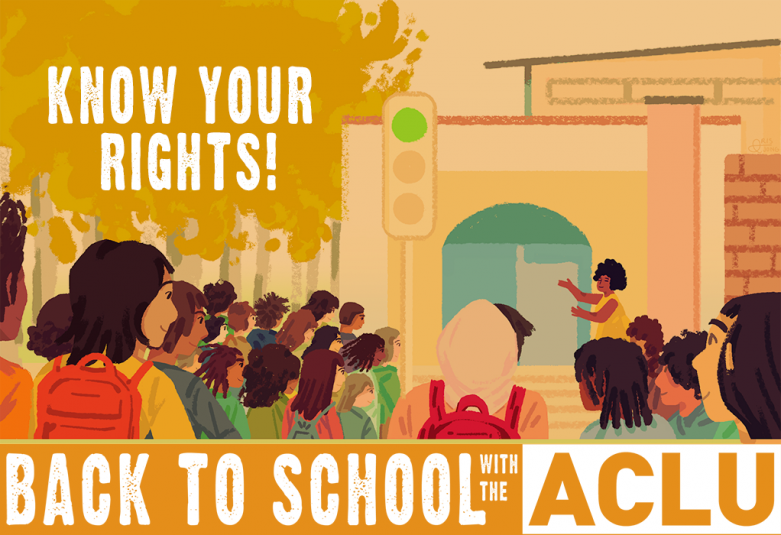Know Your Rights: Police in Schools Don’t Have Unlimited Power
Page Media

If you’re a middle or high school student in the Los Angeles Unified School District, you’ve probably been subjected to a “random” metal detector search – and if not, you’ve probably heard about them. Every day, school staff are required to interrupt class and search students and their belongings, even if they have done nothing wrong and there are no safety concerns at the school. This practice, like on-campus policing, is ineffective, intrusive, and excessive, and is applied in a discriminatory fashion against students of color and low-income students. Students aren’t suspects, and policing them undermines their education and damages school morale.
School should be a place where you can feel at home. It should be a space of learning and growth, where educators nurture your developmental needs. When police officers replace school administrators as disciplinarians, the results are often disastrous, especially for students of color, low-income students, and students with disabilities. Police presence on campus contributes to the school-to-prison pipeline that pushes thousands of youth out of the classroom and into the criminal justice system.
It’s important for you to know what your rights are at school and with the police. If you’re a student in California, you have the following rights:
- You have the right to refuse a search conducted by a police officer in your school. Even if you cannot stop the search from happening, you can speak up and say: “I DO NOT WANT YOU TO SEARCH ME.”
- You have the right to remain silent. If a police officer asks you questions, you can refuse to answer and you should ask to have a parent, guardian, or other adult present.
- Police officers must have “reasonable suspicion” to search you. And, under some circumstances, they need even more than that. This means that they have to have a reasonable belief that you broke a law or school rule and that the search would uncover evidence of the violation.
- If school officials or police officers illegally search you, they cannot use what they find against you in court. But your school can use evidence from an illegal search in school disciplinary proceedings.
The bottom line is that student behavior shouldn’t be treated like a crime, and you shouldn’t be treated like a criminal for breaking rules.
Unfortunately, over the past two decades police presence on campus has increased dramatically in California. Right now, over 1.8 million California K-12 students attend schools with a sworn officer assigned to their campus. There are 19 school districts across the state that operate their own police departments, and over 650 full-time sworn officers are assigned to school districts.
This proliferation of on-campus policing disproportionally harms students of color, low-income students, and students with disabilities. For example, Black and Brown students are far more likely to be targeted for arrest by police for minor misbehaviors. An ACLU study found California students face discrimination based on race, disability and income:
- Black students are three times more likely than white students to be arrested at school. American Indian students are twice as likely, and Hawaiian/Pacific Islander students are 1.5 times as likely. Latinx students are also arrested at a rate higher than their rate of enrollment in California schools.
- Students with disabilities are three times as likely as students without disabilities to be arrested.
- Schools where over 80% of students are low-income have an average arrest rate that is seven times higher than those where fewer than 20% of students are low-income.
In addition to the potential trauma of officer misconduct, giving a student a criminal record for minor, non-violent school violations damages the school environment and can have severe, life-long consequences. A single arrest doubles a high school student’s likelihood to dropout, makes it more difficult for them to get employed, and dramatically increases the chance that they will have future encounters with law enforcement.
If you would like to learn more about what policies your school can adopt to keep police accountable, check out our report “The Right to Remain a Student.”
Every student deserves to feel safe at school – that means not feeling harassed or targeted by police. The ACLU strongly believes that police should only be called to campus if there is a real and immediate physical threat to student, staff or public safety. In contrast, when schools turn to the police to deal with commonplace discipline, it harms students by undermining school climate and creating an environment where students are treated as suspects and criminals.
Victor Leung is deputy director of advocacy/staff attorney at the ACLU of Southern California.
Know your rights
As students head back to school, we want to make sure they are aware of their rights and know how to defend them. This week, we’re posting a series of blogs reminding students and parents of these important rights. Visit our My School My Rights page for more information.
